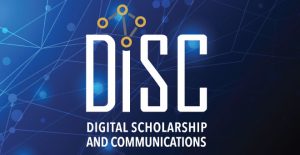 The libraries’ office of Digital Scholarship and Communications (DiSC) held a robust suite of remote workshops and lessons to support new remote needs. Series included workshops in GIS, research productivity and digital literacies.
The libraries’ office of Digital Scholarship and Communications (DiSC) held a robust suite of remote workshops and lessons to support new remote needs. Series included workshops in GIS, research productivity and digital literacies.
The Research Productivity series introduced students to major principles of digital information literacy and taught practical strategies for conducting digital research. Sessions were held in Advanced Google Scholar, Literature Searching in the Hard Sciences, Engineering, and Medicine, Managing Your Research, Zotero, Presenting Your Research, Finding and Using Census Data, Fact Checking & Critical Analysis to Prevent Information Overload and Social Media: Fake News, Alternative Facts, and Curating Your Own Information Intake.
The Digital Literacies Series included sessions on Finding and evaluating open resources, Map Literacy, Critical thinking about data visualization, Critically examining statistics in media, What are Deep Fakes and why should they make us worry?, and Digital self-defense.
In addition, lessons are now offered to develop programming skills remotely, either as part of a group working through the curriculum together, or each student on their own at their own pace. This series was designed to get students started using Python in Jupyter notebooks and teach the basics of the Python language. Lessons covered Beginner and Intermediate Python, Beginner and Intermediate R, and Beginner GitHub. Custom classes were available to individuals, classes and campus organizations.